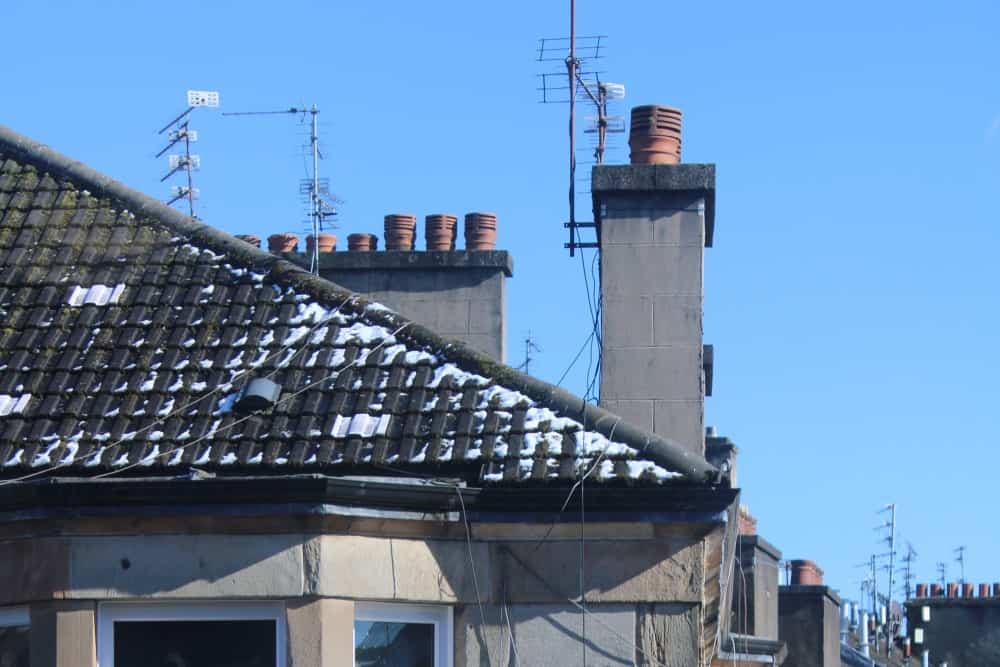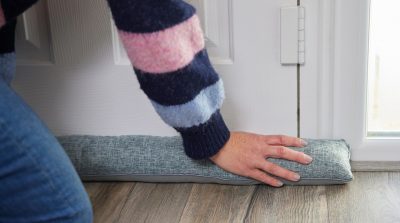Throughout autumn and winter, tenement buildings and flats often encounter a variety of common maintenance issues. In this article, learn some top tips to protect your property and preserve its value during the colder months.
Draughty windows and doors
One of the easiest issues to address when it comes to protecting your property in winter is draughts. With the colder winds blowing in, draught-proofing windows and doors is essential. Draught-proofing not only keeps your property warmer throughout winter, but also helps to reduce energy bills and make your property more energy-efficient.
Recognising the signs of draughts, such as cracks, gaps, mould, or dampness around windows and doors is the first step. If you find any of these tell-tale signs, you can try using DIY sealing tools or thermal curtains, often available at local hardware stores, to address the root cause of the draughts.
If draughts are left untreated, it could lead to damage caused by dampness, or cracks in walls may be a sign of something more serious. If in any doubt, or if the issue of draughts is more severe, it’s recommended to seek professional help.
Blocked or overflowing gutters
As rainfall increases during the winter months, preventing gutters from becoming blocked and overflowing becomes increasingly necessary. Blockages from plants, leaves, or bird deposits can lead to leaks and cause damp problems within tenement building walls. If damp is left untreated, it may result in decorative and structural damage to your property. Keep an eye out for dampness and stains beneath the gutter, indicating potential leaks and overflows. If there are plants growing out of the gutter, even small ones, this can indicate a blockage and potential water overflow.
If you live in an area where there are lots of trees nearby, consider fitting a leaf guard over the outlet to the downpipe of your gutter. This can help to prevent blockages in the downpipe and ensure gutters do not overflow. However, make sure to keep the leaf guard itself clean.
It’s recommended to clean your gutters every two years, or once every year if you live in an area with lots of trees and birds. One option for cleaning gutters is to use a vacuum gutter cleaning system which uses a high-powered industrial vacuum machine connected to a set of carbon fibre poles. The cleaning system sucks materials from the gutter and a camera can be attached to the pole end, so the operator can see what is happening.
Damp, damage, and rot
Damp can be an issue in tenement flats as it gets colder outside, and the central heating gets switched on. It’s important to maintain ventilation in your property during winter to prevent dampness due to the increased condensation. If damp is left untreated or the cause of damp is not dealt with, it can lead to mould, or even rot. Thorough cleaning in areas prone to damp and mould is crucial to prevent it from spreading and causing further damage. Additionally, affected areas should be dried out as much as possible by opening a window, putting the heating on low, or using a dehumidifier. If the issue persists, consult a professional damp specialist or contact your local council for more advice.
Winter can also be a good time to check your floors for any signs of damp or rot. If you notice any bouncy floorboards, sloping or uneven surfaces, this may indicate that floorboards are lacking support or rotting, or it could be a sign of rot in the joist ends. Left untreated, damp or rot in floorboards or joist ends can lead to structural damage to your building, so should be dealt with swiftly. If you suspect there is damp or rot in your floors, consult with a structural engineer to assess the situation. When replacing rotten floorboards or joists, it’s vital to also deal with the cause of the rot to ensure it does not return.
Avoiding burst pipes disasters
Knowing the location of the stopcock for your property is essential, especially in the winter months when there is a heightened risk of burst pipes. If you are in contact with your co-owners, encourage them to also identify and be aware of the stopcocks in their flats, especially if they’ll be away during winter. An additional measure that can be helpful is to post notices in the close telling other residents where they can find the water key and valve to shut off water for the entire building in case of an emergency. If there are exposed pipes in your building, consider adding insulation to minimise the risk of freezing.
Lastly, ensure that all the owners in your building have adequate common building insurance to effectively manage unforeseen water-related incidents. Without insurance, owners must pay for any damage to their property themselves, even if they did not cause it. The cost of repairs for major damage to a tenement building must be shared between all the owners in the building. Therefore, if one owner does not have the correct insurance, this can cause problems for every owner. Make sure you’re prepared by ensuring that you and your co-owners have adequate common building insurance for unexpected situations that may arise. To find out more about common building insurance for tenement owners, check out this article.











